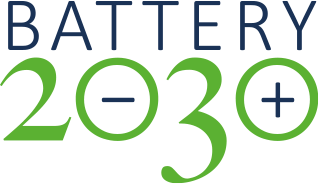Recyclability is one of the highlighted cross-cutting research areas in the BATTERY 2030+ roadmap. New knowledge and ideas about how to recycle batteries will feed into the BATTERY 2030+ research areas concering materials discovery and development, and are essential to ensure the long-term sustainability of the European battery economy.

Fraunhofer R&D Center
Electromobility.
“If we are able to integrate the five pillars of the BATTERY2030+ research agenda so that ‘design for recycling’ is not a buzzword, but is actually implemented in our research and innovation efforts, we’ll take a huge step forward to a circular battery economy, says Henning Lorrmann, Head of Fraunhofer R&D Center Electromobility.
Developing the recyclability approach is essential to ensure the long-term sustainability of the European battery economy.
“Most battery materials are located in the southern hemisphere, for example, in China (graphite and lithium), Africa (cobalt), and South America and Australia (lithium). In my opinion, there are several important reasons – political and economic, for example to reduce the dependence on raw materials from third countries, as well as societal and ecological – why Europe should strive to develop a closed materials cycle for the sustainable development of the battery industry”, says Henning Lorrmann.
This calls for new, innovative, simple, and low-cost processes targeting a high recycling rate, small carbon footprint, and economic viability, as well as logistics and business incentives.
Direct recycling
An important concept described in the BATTERY 2030+ roadmap is that of direct recycling. By reusing battery materials at a higher aggregation level (e. g. by regenerating active materials), recycling will become more cost effictive and sustainable.
“Our work here is related to material functionalisation to enable direct recycling and to the development of selective recycling processes”, says Henning Lorrmann.
He also highlights cross-cutting topics in which recycling has a place, such as understanding and designing interfaces and introducing sustainability into the BIG-MAP platform for the discovery of new materials, as well as ensuring longer lifetimes, longer stays in the material cycle and ithe dentification, repair, or replacement of defective components.
What are the challenges within the field of recyclability?
“The actual actions on recycling proposed within the BATTERY2030+ framework will be a few of many pieces of the puzzle called the circular economy. Logistics, political and economic incentives and regulations will be others. Establishing solid business models of battery recycling these days, when the market is booming and only partially regulated, will be very challenging. Also, logistics between customers, distributers, local recyclers and large recycling facilities and the tractability of the battery materials for a huge variety of different cell designs and chemistries are not yet established”, says Henning Lorrmann.
And how can BATTERY 2030+ help to tackle these challenges?
“By gathering a large and interdisciplinary community, BATTERY2030+ will provide a sound scientific foundation and technological innovations for the recycling sector. The experts within the community are also very well connected to national and European stakeholder platforms, such as Batteries Europe, and support setting up the framework for a sustainable European battery eco-system”.
What motivates you to engage in this area of research?
“Battery recycling and research and innovation actions in this field seems to lag behind the fancier topics, such as new cathode materials, and solid- state- batteries. Considering our quite special position in the world and the battery sector, it has become more and more obvious that support in setting up the *back end* of the Lithium-ion battery chain in Europe woudl be interesting and also a significant activity”.
Josefin Svensson
